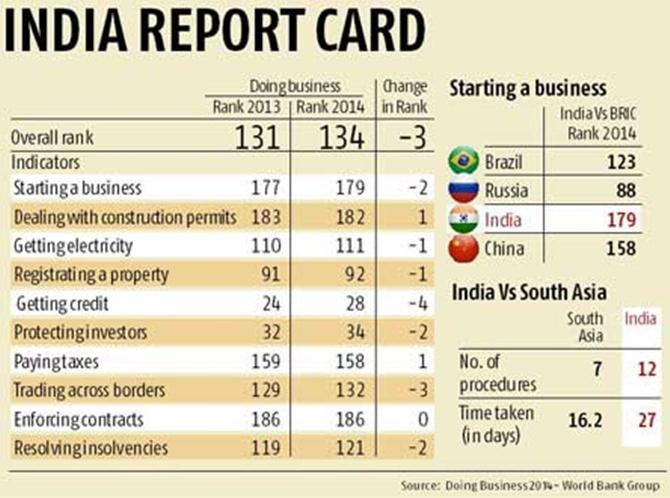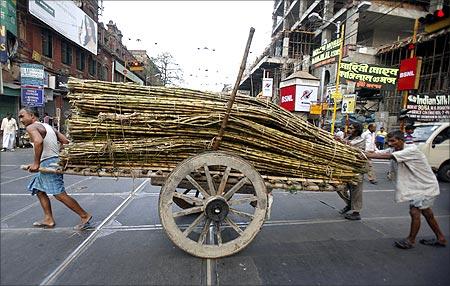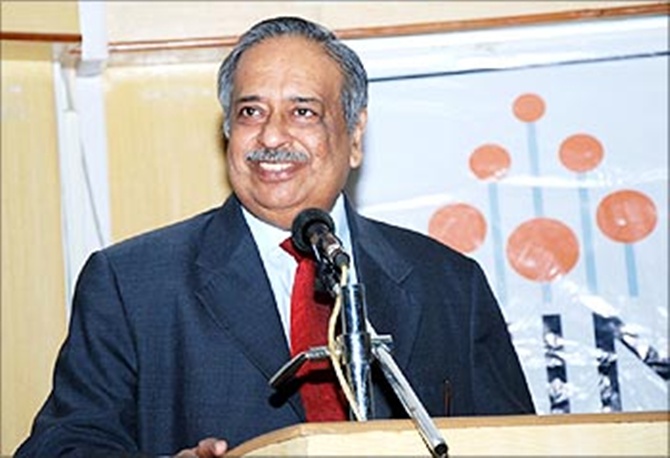Photographs: Jayanta Shaw/Reuters BS Reporter
The average number of procedures for starting a business is seven among South Asian economies, it is 12 for India.
Even after two decades of economic reforms, India continues to falter on various Ease of Doing Business sub-indices such as starting a business, dealing with construction permits, getting electricity, registering property, paying taxes, trading across border, enforcing contracts or resolving insolvency.
This year's annual study of the regulatory environment for small and medium-sized businesses from 189 countries, by the World Bank Group, is no different.
...
Why is India a difficult country to do business in?
Photographs: Reuters BS Reporter
India figures at the bottom of the pile in most indicators. Its overall rank in Ease of Doing Business has dropped from 131st position in 2013 to 134th in 2014 (to some extent on account of expansion in a number of countries under study).
Against the key parameter of starting a business, India is worst off among the BRIC economies. It is in 179th position, while Russia is at 88th, Brazil at 123rd and China at 158th.
In terms of the number of procedures and time required to start a business, India is below average among South Asian economies (eight countries).
...
Why is India a difficult country to do business in?
The average number of procedures for starting a business is seven among South Asian economies, it is 12 for India.
The average time taken to start a business in South Asia is 16.4 days, while it is 27 days for India.
An entrepreneur in India has to deal with 35 procedures to get a construction permit, while in South Asia its less than half fat 16. An SME businessman in India would take 1,420 days to enforce a contract. The South Asia average is 1,075 days.
...
Why is India a difficult country to do business in?
Photographs: Reuters
Even though several countries, including India and China, have expressed concerns about the country ranking in the report, an independent review panel appointed by the World Bank has suggested changes in the methodology adopted.
Nevertheless, faced with criticism, Indian government has appointed a committee - headed by former Sebi Chairman M Damodaran - to suggest regulatory measures to ease the regulatory environment.
Why is India a difficult country to do business in?
Image: M Damodaran.Ranking does not justify our potential: M Damodaran
After a year of deliberations with various stakeholders within industry and the government, the Committee for Reforming the Regulatory Environment for Doing Business had come out with its recommendations in September this year.
In an email interaction with Sudipto Dey, Committee chairman M Damodaran - who is currently on a holiday in the United States - explains why India's low rank in the Doing Business Report does not surprise him. Edited excerpts:
Why does India continue to perform poorly in the World Bank's Ease of Doing Business parameters?
The mother problem is our understanding of what constitutes reforms. In the last two decades, we have plucked some low-hanging fruits, and some of that under circumstantial compulsion. Even today, the urban intelligentsia and a large segment of the media equate economic reforms with a few high-profile items like increasing FDI in insurance or opening up the banking sector to foreign participants, ignoring the principles of reciprocity and non-discrimination.
The ease of doing business has never been addressed as a subject meriting serious attention. Why should our low ranking surprise us? The sad part is that the ranking does no justice to our immense potential.
Discretionary powers and opaque procedures continue to plague business decision-making. Why have we failed to bite the bullet in this respect?
Discretionary power by itself is not necessarily bad. It is a well-understood concept in administrative law. The important requirement for legitimate exercise of discretionary power is that such exercise of power should be within well-laid out guidelines.
If the guidelines are clear and are within the public domain, decision-making will not be opaque. Discretionary power, legitimately exercised, is often the only way to address the problems caused by rigidity of rules and regulations, the overriding consideration being that public interest is paramount.
Do you expect the new Companies Act to address any of the issues that hinder ease of doing business in India?
It is too early to conclude what effect, if any, the Companies Act, 2013, will have on the ease of doing business. Many rules under the Act are yet to be finalised. Even after that is done, the manner in which the rules are administered, and the mindset of those at the cutting edge will be critical.
Corporates claim that regulatory compliance costs have gone up, which eventually gets passed on to consumers. Do you agree with this assessment?
On the need to have only a limited number of regulatory bodies, all of which are adequately manned and appropriately empowered, there are clear recommendations in the committee's report. The problem of increasing regulatory costs stems from an excessive number of regulations, some of which are not well thought through.







article